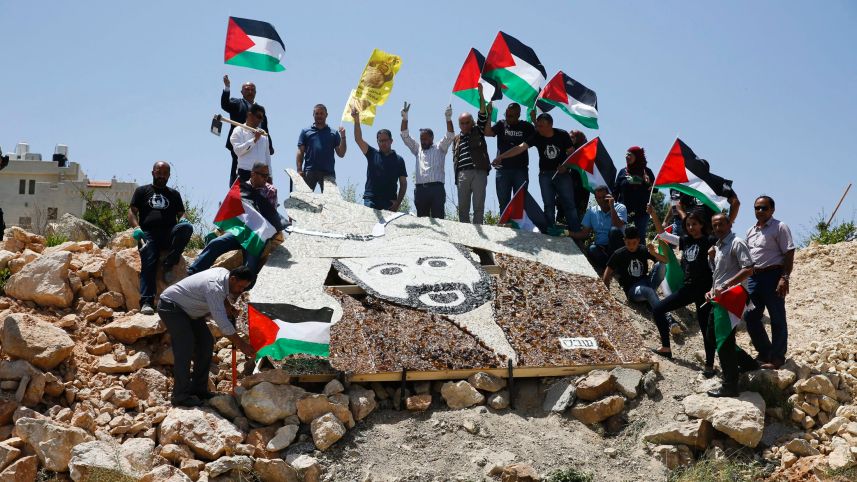
Palestinian activists stand around a mosaic portrait of Marwan Barghouti near an Israeli military installation in the West Bank city of Ramallah, May 9, 2017. Nasser Shiyoukhi/AP
Hunger-striking Palestinian prisoners wrote a letter on Tuesday to Pope Francis asking him to intervene with the Israeli government and the international community to help them achieve their demands.
The appeal was delivered in a letter by Fadwa Barghouti, the wife of imprisoned hunger strike leader Marwan Barghouti, when she met with the heads of the Catholic Church in Ramallah. The letter describes the conditions as presented by the Palestinian side, along with figures relating to the prisoners.
According to the letter, there are currently 6,500 Palestinians in prison in Israel, 300 of whom are children and 57 are women. Among them are 13 members of the Palestinian parliament and 500 administrative detainees who are in prison for an undetermined amount of time. “The Israeli courts are a tool for oppression and not for justice, especially the Israeli military courts, where the rate of conviction is between 90 and 99 percent,” Barghouti wrote.
According to the letter, the prisoners launched their strike over a lack of the most basic rights and their demand was “to put an end to arbitrary and punitive actions, to torture and abuse, to intentional medical neglect.” Barghouti wrote that the prisoners were demanding the right to regular visits by relatives and the right to an education. “They are risking their lives to achieve what they are entitled to. They are hunger striking because they are the victims of collective punishment by Israel and have been abandoned by the world,” he wrote.
The letter urged Pope Francis to speak out on the matter “to help save the lives of sons, husbands and fathers, to speak for the women and the children in Israeli prisons, to speak about this holy land that has been desecrated by occupation, discrimination, segregation and apartheid, while it needs to be a land of pluralism.”
In a related development, Palestinian President Mahmoud Abbas mentioned the prisoners’ hunger strike in talks with German President Frank-Walter Steinmeier during his visit to Ramallah, saying that the prisoners’ demands were humanitarian in nature and that they should be met.




